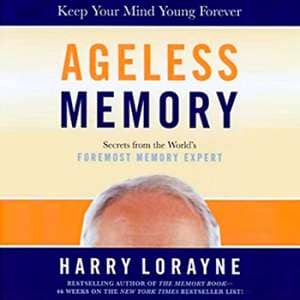 One of the coolest things about Ageless Memory is that Harry Lorayne proves the concept.
One of the coolest things about Ageless Memory is that Harry Lorayne proves the concept.
He’s in his nineties as I’m preparing this review and still sharp as a whistle.
And you don’t have to take my word for it.
They streamed his 96th birthday on YouTube and you can decide for yourself just how his memory and mental cognition have held up.
Personally, I’m both inspired and astonished.
And I can’t wait to be this on-the-ball myself when I reach his age.
To say that I’m a fan of Ageless Memory would be an understatement.
I think it’s Lorayne’s best memory improvement book and in this Ageless Memory Review, I’ll tell you why.
Who Is Harry Lorayne?
Harry Loryane is a legendary memory teacher and world class magician.
Born in 1926, Lorayne had a hard childhood. He literally grew up in a ghetto.
Worse, his father used to punch him for getting poor grades.
As Harry Lorayne told me in an interview, he was never scared about failing school. He was afraid of getting hit and the pain it caused him.
His father died when he was twelve, but the failing grades persisted. One day, Lorayne paused and wondered why other students were doing better on their tests.
And it dawned on him that a big part of the problem was his memory.
So Lorayne went to the library and discovered memory techniques in what he told me were some “dusty old books.” One of them was the Rhetorica ad Herennium.
Over the years, Lorayne practiced these techniques and developed his intelligence. Then, he decided to share the knowledge with others by writing about mnemonic techniques for a mass audience.
We’re all glad that we did because his books have made a huge impact on learners around the world.
His first memory book was How To Develop a Super Power Memory, published in 1957.
Many of his other books include variations on the core teachings he shared in this initial publication.
But we’re so glad that he continued putting out memory training. And now that he’s in his 90s, he’s still inspiring us by sharing his life and his many accomplishments.
Ageless Memory Review: What You Need to Know
Ageless Memory is for readers of all ages, but Lorayne is clearly addressing this book to those who may be suffering what he calls “senior moments.”
He spends a small amount of time at the beginning addressing myths we have about aging and memory.
Next, you get crisp chapters on memory science and the history of memory techniques.
These parts of the book are quite refreshing because in other works Lorayne tends to refer to these topics in passing. By including some memory science, Lorayne increases the accuracy of what he’s teaching.
And finally Lorayne gives us a deep dive into some of the key figures who were so essential to him being able to improve his life by improving his memory. The historical data alone is worth the price of admission so that you can look up some of these historical figures on your own.
In the rest of the book, Lorayne dives into teaching you how to make your brain remember just about anything. These parts of the book range from what memory techniques are to specific ways that you can use them to achieve a range of learning goals.
But it’s not just about learning. Lorayne also gets into how you can experience better performance during leisure activities. Let’s take a deeper look at what Lorayne has to offer when it comes to these two realms.
The Strongest Parts of Ageless Memory
Lorayne is very strong when it comes to keeping things simple. You learn the basics of association through mnemonic imagery.
You learn:
- Linking
- Tactics for remembering names
- How to memorize vocabulary
- How to remember numbers using the Major System
- The pegword method
Then, since many people in his age group need to take medication, Lorayne discusses how to remember when to take your pills.

The biggest part of the book cover the application of the techniques to names and faces. I feel this is well chosen because so much of life’s pleasures come from social occasions. And being with others is vastly enhanced when you can remember people’s names, both during the meetings and when enjoying memories of meeting with people later.
Finally, the book goes into a lot of fun activities that will keep your brain sharp, such as learning Morse Code, memorizing scripture and applying memory techniques to memorizing cards. That way, you can win more often while you enjoy the brain exercise of the car games you enjoy.
The Best Part Overall
For years, I’ve cautioned readers of this blog that mnemonic examples are a dead end for people who truly want to learn to use memory techniques.
Ageless Memory is the first time I’ve heard Lorayne address this issue. But perhaps reviewing Rhetorica ad Herennium, which also contains arguments against mnemonic examples, prompted Lorayne to also make the point loud and clear:
As I’ve told you, you’re better off “thinking up” your own ridiculous or impossible pictures. When I’m teaching the idea, however, I have no choice but to give you examples or suggestions. The reason you’re better off creating your own is that then you are forced to pay attention to, concentrate on, the two items. My suggestions—my help—may not really be helping you. But if you are aware of that, if you use my suggestion but really see that picture in your mind as if you’d thought of it yourself, then that’s all right.
Lorayne is better and more patient than I am, however. I’m not convinced that it is alright to just “really see” his suggestions in your mind.
And that leads us to one of the two weaknesses in the book.
My Only Two Criticisms Of Ageless Memory
In my view, there are only two things that will date Ageless Memory.
- The book is picture oriented, but we now know that some people can’t easily picture images due to aphantasia or other forms of mental experience.
- Lorayne goes out of his way to avoid using the term, Memory Palace.
Let’s discuss each of these on their own terms.
First, because Lorayne is so picture and image-oriented, some people will benefit less from this book. You may want to seek out a memory improvement book that includes more multisensory elements.

Second, although Lorayne discusses loci, he seems to go out of his way to avoid discussing the obvious extension of this technique by not mentioning Memory Palaces at all.
No one is sure why. Jonathan Levi was completely confused by this omission and Lorayne seemed quite combative about the topic during an otherwise epic interview about his work.
Perhaps why Lorayne passed over this critical technique throughout his career will just have to remain a mystery. But in Ageless Memory he at least finally gets close by mentioning loci quite a few times.
Should You Read Ageless Memory by Harry Lorayne?
Absolutely, yes.
But if you’re a reader of this blog, you know that I believe we should all read as many memory improvement books as we can get our hands on.
This is because “one” is the most dangerous number in all learning endeavors. We want to expose ourselves to as much knowledge as possible.
But I also believe that of all Harry Lorayne’s memory books, Ageless Memory is the best. It includes everything that made his earliest books great.
And by defining a specific audience, Ageless Memory helps us all a lot more. After all, we’re all aging.
But our memory does not have to suffer the effects, and Harry Lorayne remains not only an incredible leader in the field. He has lived masterfully and like Tony Buzan, Lorayne makes it impossible not to see for your own eyes how impressive memory techniques can be when you make them part of your daily life.
Related Posts
- The Memory Book By Harry Lorayne and Jerry Lucas
The Memory Book is a classic. Here's a quick rundown of its strongest points and…
- How to Develop a Super Power Memory Review: Legit?
It's a legendary memory training book. But has How to Develop a Super Power Memory…
- Memory Rescue Review: Can This Book Supercharge Your Brain?
Is Memory Rescue the book you're looking for? In this Memory Rescue review, we'll look…





